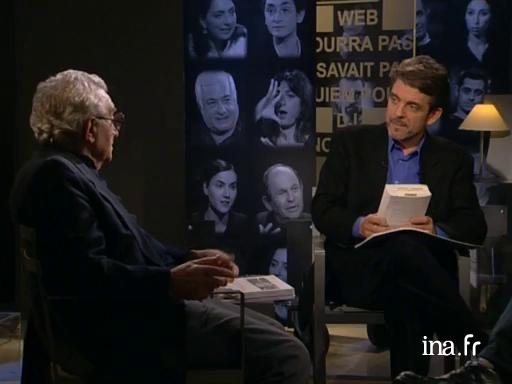Philippe Lefait
Angel Wagenstein, you are Bulgarian...
Angel Wagenstein
Yes.
You are 82 years old. .
Yes, that, you don't always need to say it.
Philippe Lefait
We can say it today because it explains your distance, and in some ways, a certain form of wisdom.
What is striking in your work is that you are a scriptwriter, a cinematographer, a novelist,
which is precisely this distance, and not only that given by age.
I have the impression that it is a distance that came to you early, very early,
because during the Second World War, you were condemned to death,
and that this experience makes you write,
in any case, prompts you to put into the mouth of one of your characters in "Adieu Shanghai"
Hilde who is one of the main characters in your book...
You have her say:
"At 23, one knows everything worth knowing, what one learns after that is nothing but landscape detail."
Angel Wagenstein
I am sure it is like that.
Philippe Lefait
And I am sure that it is you who says it, not only Hilde.
Angel Wagenstein
Yes, I say it, that is true.
Philippe Lefait
W quick biographical reference, I said you were Bulgarian,
that you were therefore born in 1922 in a town south of Sofia called Plovdiv.
If you had to give three or four biographical elements from this period,.
how would you speak of your identity card,
nowadays, do you state '8 decades' on your identity card?
Angel Wagenstein
Bulgarian, Bulgarian Jew is more correct.
Who spent his childhood, small childhood, in France, in exile with his father who was a political exile.
And I love Bulgaria, I do not leave Bulgaria.
That means that I travel a lot, but I always return, like elephants, I always return to where I was born.
There!
That is my wife, she is Bulgarian, my wife.
I cannot say any more.
I have always been very engaged, in the struggle for the humanitarian, for a peace against fascism. Always...
And it is for that reason that I always ask that my books not be presented as Jewish books,
these are books about the destiny of Jews.
But I could also write books on the destiny of Gypsies for example, with all my heart,
Philippe Lefait
One thing that is remarkable in your books published with Esprit des péninsules,
is always this distance that you place in relation to a history that damaged you, always, systematically.
This distance that is translated by constant humor.
Angel Wagenstein
Yes, I wouldn't say it is a distancing.
In my opinion, it is a manner of telling stories, not always with humor.
For example, "The Pentateuch, or Isaac's Torah", if you have read it, it is full of Jewish jokes,
but the third book is truly tragic.
There is no joking here, except for a joke that Hitler tells the foreign journalists, that is the only joke here.
So, I am not always the same, I change the style.
There are corners of life where you cannot laugh.
There, it is diverse.
If you like jokes, read "The Pentateuch".
Philippe Lefait
I am not speaking of jokes, I am talking about humor.
Angel Wagenstein
Humor, ah, yes, that is also something if you like...
Philippe Lefait
Which is more a sort of distancing, because...
Angel Wagenstein
In "Abraham the drunk", yes.
Philippe Lefait
Because you have been damaged?
Angel Wagenstein
Humor, laughter is also a weapon of survival, a weapon for the struggle, a resistance weapon.
I remember in our condemned prison cells, there were 8 of us, and we laughed a lot.
You have to laugh, with us, otherwise one must hang oneself.
I was in the labor camps for Jews in Bulgaria, and we laughed a lot.
In my opinion, laughter is also a resistance weapon.























